ABU DHABI // Luggage and cargo scanners capable of detecting radioactive material and explosives through 35cm of steel will be installed at airports, border crossings and government buildings throughout the country in a multimillion-dollar deal between the Abu Dhabi police and an American technology firm. The X-ray machines, built by the Atlanta-based ScanTech Holdings, will appear first in Abu Dhabi, but police plan to spread the technology across the UAE then throughout the GCC region, said Major Fawaz Badran al Qaraeen, from the Ministry of Interior.
Major Qaraeen said the new equipment, which ScanTech says is capable of detecting nuclear and radioactive material, explosives, drugs and liquid materials, is being introduced as part of an overall effort to modernise security. "This is not due to any imminent threat," he said. "It is a precaution. The aim is to be comprehensive in providing security." The deal came after Dubai Customs conducted its first programme, on Wednesday, to train inspectors in spotting material that can be used in weapons of mass destruction.
In its recent proposal to develop nuclear energy, the Emirates pledged it would establish protections and controls over nuclear materials in line with international standards, and work with members of the International Atomic Energy Agency (IAEA) to ensure recovery of stolen or smuggled material. According to the IAEA's Illicit Trafficking Database, from 1993 to 2006 there were 275 confirmed incidents of theft and attempts to illegally trade nuclear materials, 15 of them involving highly enriched uranium and plutonium. Authorities in the UAE have striven to strengthen enforcement, after the country was characterised as a weapons smuggling hub during the failed bid by Dubai Ports World to oversee operations at US ports. In March, prosecutors in Dubai announced they would prosecute a man for attempting to deal 240kg of zirconium, a metal used to build nuclear reactors. The trial is still under way.
Officials said ScanTech would supply Abu Dhabi with two different scanning machines, a mobile unit that could be installed at airports and buildings, and a larger, permanent scanning machine that could survey shipping containers. The machines can determine shapes and the make-up of items by shooting beams from two dimensions and using software that calculates the density and atomic weight of objects.
David Brewer, technical adviser to the Abu Dhabi police, said the force was impressed by ScanTech's equipment. "The results of their technology are remarkable," he said. "The system can identify any material based on its atomic properties, including nuclear items, explosives, drugs, inflammables and other contraband." The deal's financial details were not revealed, and officials did not say how many pieces of equipment would be ordered. ScanTech has said, however, that its mobile inspection system has sold for US$3 million (Dh11m) a piece, and expects revenue over two years to reach almost US$150m.
Major Qaraeen praised Sheikh Saif bin Zayed, Minister of Interior, for deciding to make the investment. "His Highness diligently seeks innovative and effective technologies to maintain and solidify the United Arab Emirates borders, providing greater security and harmony for the benefit of all people," he said. However, some US scientists argue that detection systems, even the most advanced, cannot reliably detect radioactive material. In March, researchers from the Natural Resources Defense Council (NRDC) published an article in Scientific American, stating that detectors now in use at US borders did not pick up quantities of highly enriched uranium brought through in two field experiments.
"No system is foolproof," said Julia Bovey, from the NRDC. "We've seen in our experiments, you can carry depleted uranium in a Coke can and not be detected. This is not a situation where we can rely on technology." @Email:sdin@thenational.ae
